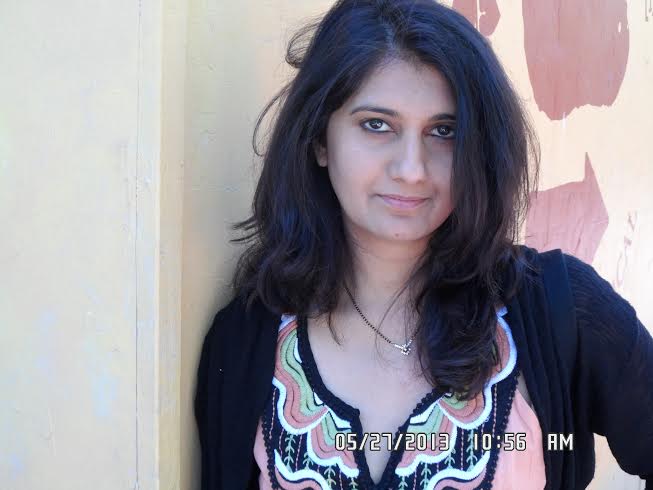Contribute
| Young Professional - Ashima Duggal, Filmaker |
Nirmala Garimella
06/15/2015
Young Professional - Ashima Duggal
Could you tell us a little about your background?
At the University of Texas at Austin, I fell in love with the humanities. I had a multi-disciplinary focus majoring in Asian Studies and Philosophy, with a minor in Economics. I had the opportunity to take diverse courses like History of India, Sociology of Japan, Philosophy of Eastern Religions, and Political Economy of Southeast Asia. This diverse base of subjects influenced my world-view - enabling me to see life, history, and culture through a dynamic lens.
I continued on to law school where I focused on human rights and international law. After graduation, I enjoyed working at the largest full-service immigration firm in the United States, Foster Global in Houston, for several years. As an immigrant myself, I was disturbed by the growing xenophobia in the political landscape and I sought to work on immigration policy. I got a chance to at the US Department of Labor in Washington DC, but unfortunately due to personal reasons, I relocated to New England shortly thereafter.
Can you tell us about your current position?
In addition to practicing law, I recently ventured into documentary filmamking.I am currently helping produce a short documentary, “Raising Men,†about personal transformation – of how young men can be made allies in the quest against violence against women in India. I am also currently directing and producing “The Battling Rappers of Kathmandu,†a film about three frustrated, passionate Nepalese youth who rap and rally for political freedom and free expression and I am producing “The Returned,†a film about Honduran refugees facing persecution at home and deportation in the U.S. I have also served as an Associate Producer for “What Tomorrow Brings,†a film about one year in the life of the first all-girls’ school in an Afghan village, which will be released in 2015.
In addition to practicing immigration law, I have recently started consulting with DAWN, a non-profit in Cambridge whose mission is to end gender-based violence and advance gender equality by strengthening civil society response and engagement. I am working on operations management and strategy.
What do you enjoy about filmmaking?
I have observed that the camera has a way of engaging and coaxing the consciousness of its subject like no other instrument or person. At the same time, filmmaking is a selfish pursuit for me: it is a portal into my Self. Through the medium, people are confronted with their past and current reality, their memories and their identity in a visceral, raw way. Through the lens, I get a chance to see people like never before, and through my own conscious presence behind the lens, I see into my Self.
How did you choose filmmaking and advocacy?
I wanted to do something that would enable to me to use both creative and analytical parts of my brain.Documentary film fits this rather abstract goal; however, I have realized that without the component of advocacy, media, strong distribution and oftentimes organizational support, the film itself has little impact.
To apply these components and my creative/analytic skills to just any cause would not satisfy me. It has to be something I feel strongly about. Immigration rights and Gender rights/gender violence is a significant cause I am passionate about. I am navigating a future career in this field - one that is not focused on one narrow area, but may include legal, policy, film, media, civic engagement and other aspects.
How did you get to where you are today?
I think the one thing that will make you successful in anything you do is building and maintaining strong professional relationships. The secret to building relationships is nothing new: being reliable and trustworthy, positive, cooperative, and knowing when to lead and when to follow are what will get you there.
What advice would you give to others who want a career like yours?
Always challenge yourself and look for the possibility in everything. Every assignment and position is an opportunity.
How do you manage a balance between your Indian and American Cultures?
Culture is not static. The culture I have experienced in homes of affluent New Delhi society versus in smaller towns in Rajasthan are unique and equally valuable. Similarly, the culture of Houston suburb differs greatly from coastal Boston. The values and points of view that I have formed through living in different parts of the United States and visiting different parts of India and the world have given me the chance to have a more global, multi-layered and compassionate outlook.
What do you do in your spare time outside of work?
As a film buff, I love watching the latest American, foreign and Hindi films. I am really impressed with the new wave of Indian directors who are making new genres of film and modern films with diverse voices, including a much-needed feminist perspective.
I also practice Vipassana meditation, read fiction and I enjoy photography.
Can you finish this sentence - I believe?
I believe in giving voice to previously unheard narratives and change-makers who disrupt our understanding of the status quo. I am particularly interested in the intersection of film and media as a vehicle to influence human rights-based policy and development.
You may also access this article through our web-site http://www.lokvani.com/
